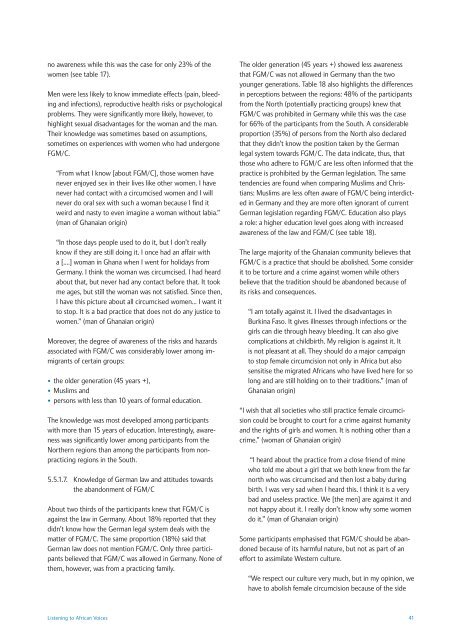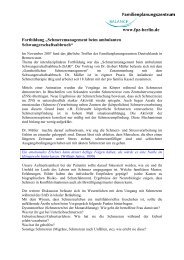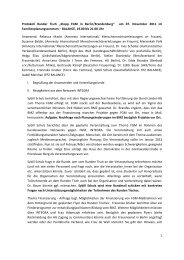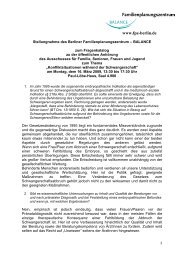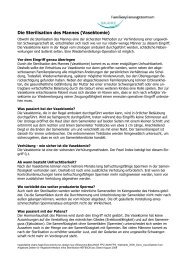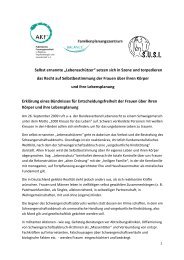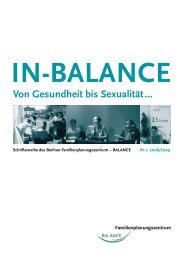Listening to African Voices - FPZ
Listening to African Voices - FPZ
Listening to African Voices - FPZ
You also want an ePaper? Increase the reach of your titles
YUMPU automatically turns print PDFs into web optimized ePapers that Google loves.
no awareness while this was the case for only 23% of thewomen (see table 17).Men were less likely <strong>to</strong> know immediate effects (pain, bleedingand infections), reproductive health risks or psychologicalproblems. They were significantly more likely, however, <strong>to</strong>highlight sexual disadvantages for the woman and the man.Their knowledge was sometimes based on assumptions,sometimes on experiences with women who had undergoneFGM/C.“From what I know [about FGM/C], those women havenever enjoyed sex in their lives like other women. I havenever had contact with a circumcised women and I willnever do oral sex with such a woman because I find itweird and nasty <strong>to</strong> even imagine a woman without labia.”(man of Ghanaian origin)“In those days people used <strong>to</strong> do it, but I don’t reallyknow if they are still doing it. I once had an affair witha [….] woman in Ghana when I went for holidays fromGermany. I think the woman was circumcised. I had heardabout that, but never had any contact before that. It <strong>to</strong>okme ages, but still the woman was not satisfied. Since then,I have this picture about all circumcised women... I want it<strong>to</strong> s<strong>to</strong>p. It is a bad practice that does not do any justice <strong>to</strong>women.” (man of Ghanaian origin)Moreover, the degree of awareness of the risks and hazardsassociated with FGM/C was considerably lower among immigrantsof certain groups:• the older generation (45 years +),• Muslims and• persons with less than 10 years of formal education.The knowledge was most developed among participantswith more than 15 years of education. Interestingly, awarenesswas significantly lower among participants from theNorthern regions than among the participants from nonpracticingregions in the South.5.5.1.7. Knowledge of German law and attitudes <strong>to</strong>wardsthe abandonment of FGM/CAbout two thirds of the participants knew that FGM/C isagainst the law in Germany. About 18% reported that theydidn’t know how the German legal system deals with thematter of FGM/C. The same proportion (18%) said thatGerman law does not mention FGM/C. Only three participantsbelieved that FGM/C was allowed in Germany. None ofthem, however, was from a practicing family.The older generation (45 years +) showed less awarenessthat FGM/C was not allowed in Germany than the twoyounger generations. Table 18 also highlights the differencesin perceptions between the regions: 48% of the participantsfrom the North (potentially practicing groups) knew thatFGM/C was prohibited in Germany while this was the casefor 66% of the participants from the South. A considerableproportion (35%) of persons from the North also declaredthat they didn’t know the position taken by the Germanlegal system <strong>to</strong>wards FGM/C. The data indicate, thus, thatthose who adhere <strong>to</strong> FGM/C are less often informed that thepractice is prohibited by the German legislation. The sametendencies are found when comparing Muslims and Christians:Muslims are less often aware of FGM/C being interdictedin Germany and they are more often ignorant of currentGerman legislation regarding FGM/C. Education also playsa role: a higher education level goes along with increasedawareness of the law and FGM/C (see table 18).The large majority of the Ghanaian community believes thatFGM/C is a practice that should be abolished. Some considerit <strong>to</strong> be <strong>to</strong>rture and a crime against women while othersbelieve that the tradition should be abandoned because ofits risks and consequences.“I am <strong>to</strong>tally against it. I lived the disadvantages inBurkina Faso. It gives illnesses through infections or thegirls can die through heavy bleeding. It can also givecomplications at childbirth. My religion is against it. Itis not pleasant at all. They should do a major campaign<strong>to</strong> s<strong>to</strong>p female circumcision not only in Africa but alsosensitise the migrated <strong>African</strong>s who have lived here for solong and are still holding on <strong>to</strong> their traditions.” (man ofGhanaian origin)“I wish that all societies who still practice female circumcisioncould be brought <strong>to</strong> court for a crime against humanityand the rights of girls and women. It is nothing other than acrime.” (woman of Ghanaian origin)“I heard about the practice from a close friend of minewho <strong>to</strong>ld me about a girl that we both knew from the farnorth who was circumcised and then lost a baby duringbirth. I was very sad when I heard this. I think it is a verybad and useless practice. We [the men] are against it andnot happy about it. I really don’t know why some womendo it.” (man of Ghanaian origin)Some participants emphasised that FGM/C should be abandonedbecause of its harmful nature, but not as part of aneffort <strong>to</strong> assimilate Western culture.“We respect our culture very much, but in my opinion, wehave <strong>to</strong> abolish female circumcision because of the side<strong>Listening</strong> <strong>to</strong> <strong>African</strong> <strong>Voices</strong> 41


